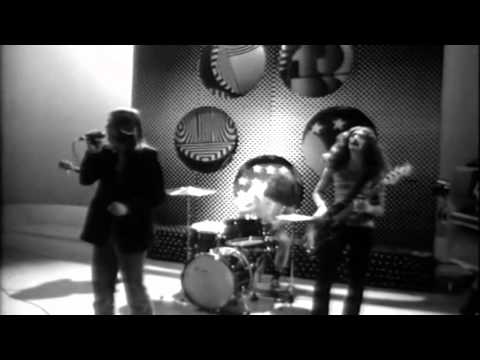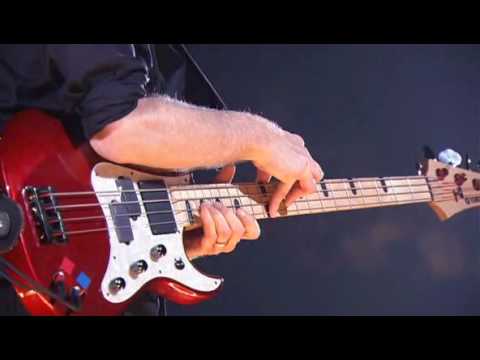If nobody forms a band called ‘The Flying Fingers’ after reading this thread; I’ll be disappointed 
Flying plucking fingers is an understatement. That guy has slappity bouncy hippity hoppity skipping wondering flying fingers! 
That solid power stand calls for honorable mention as well!
Another vote for who cares if it gets the job done.
Salute! @Lanny Lanny 
One of my bass hero’s has the worts case of flying plucking and fretting fingers. Geezer Buttler.
This video is timed to start at 1:00. Watch at 1:03
I play this song, and I can’t even play it with my fingers not set on the board for those octaves. I can’t imagine playing cleanly with flying fingers and beating the shit out of the strings with my plucking hand, but he can, and he rocks.
Then watch at 1:37.
Oh, and the whole video, watch his plucking, or in reality his punching right hand fingers.
I think, and said before, that when playing some aggressive style hard rock / thrash / punk / metal stuff, fingers fly, I see it all the time (now that I always try to pay attention to the bass player when watching live music).
Yes, when playing controlled shredding progressive jazz like Josh, Scott Devine and Mark do, the fingers are very controlled and, it is probably more necessary to play good when playing this.
Me too.
BOTTOM LINE
If you think you have flying fingers, AND care to correct it, go for it.
If you think you’re playing is progressing and you are loving it, but your fingers are flying a bit, SFW.
I could care less about doing things that make me sound 1% better, but what I want to do is make sure I’m not doing anything that can cause long-term injury, that I’m able to play the songs that I want to, and that I’m playing efficiently to lengthen playing time.
I personally care about flying fingers because it uses more energy up and lessens the ability to play fast passages due to longer travel time. Anything that makes my hands less tired is a good thing in my book. It may help to visualize if a pianist had flying fingers what impact that would have. Also keep in mind that I’m classically trained on piano/violin and they tend to be more strict on stuff like this so it may be programmed into my brain.
This is my personal view though. If others want to let their fingers soar and don’t mind, then that’s up to them. I definitely don’t think it matters for most casual players. I am indeed a casual player, but it’s just something I’ve chosen to work on to improve. It’s similar to music theory to me. Plenty of top bassists don’t know much music theory and it’s not a requirement, but I choose to understand it better as I think it will personally make me a better bassist. We each have our own journeys.
It’s hard to say as mot of the example posted are professionals that play very hard, they really dig in to the strings to get their “signature sound”. I’m sure in they play the “unplugged” version it would look much tighter. These guys turn it up to 11 when the play live.
Like everything else, when you are good at something you’d make it look effortlessly flying finger or not. We can’t all look like Scott Devine playing heavy stuffs. Lol
My index flys occasionally, partly as the muscle is slightly shorter from poor physio after breaking my arm as a kid. It doesn’t bother me and just requires more concentration with my fretting hand.
I agree with you completely. I don’t know why people argue for playing with poor form, it’s not like it’s hard to play with good form, it takes a little effort at the beginning and then it makes everything easier after that. It’s like typing with 2 fingers or playing trumpet with the middle of your fingers instead of the tips. I enjoy practicing good form, it’s not like it’s a hardship that ruins my enjoyment of playing. Every instrument has some technique you want to pick up early and it’s much more difficult if you dont and have to fix it later.
With respect I think the overarching sentiment of this thread is to encourage beginners to have fun and keep playing rather than being needlessly messianic about the fretting hand. Start with good basics, sure but let’s not lose sight of the fun part ![]()
I think it’s different for everyone how much technique practice is enjoyable and how much feels like a chore and as most of us don’t even aspire to be professional players the fun part should be the main focus. I personally like a warmup/practice routine but if it keeps you from picking up the bass then don’t do it.
The thing I try to do is not learning bad habits that would be easy to learn right but hard to correct, but flying fingers were not on that list for me. It’s something to iron out when you feel up to it and either want to improve your playing or hit a wall.
Yeah, thats my whole point. When playing fast and aggressive, and heavy, it seems like fingers fly.
Playing progressive jazz, fingers don’t fly.
Jerry Lee Lewis certainly did not have classical trained piano fingers, his whole hands flew to be aggressive with rock n roll.
exactly
Technically very impressive, but for me personally… leave the fast playing to guitarists. I’ve never been a fan of crazy fast bass solos. They just don’t sound good to my ears (or soul). I think it might simply be that I prefer some note duration on low frequency sounds. I think “Hysteria” by Muse is about as fast as I like to hear it That being said, I enjoyed watching the video. The man has some mad chops! Thanks for sharing!
As an intermediate bassist who is trying to tame flying fingers, I think there’s a major factor I haven’t seen mentioned here (sorry if I missed it).
It’s a LOT easier to learn correct technique in the beginning than it is to correct bad habits later. Yes, if you’re just beginning BtBA (or the equivalent), you don’t need to worry so much about flying fingers. But once you’re halfway through the course, it is something you should be mindful of if you’re serious about being a proficient bass player.
Someone mentioned trumpet, and I concur with those observations. Every instrument has proper techniques to learn, and there are good reasons for all of them.
I doubt anyone puts in the time required to learn an instrument without also wanting to be as proficient as they can (to a certain point), and as a bass player, having good fretting technique is a key part of that proficiency. Again, don’t need to worry about it at the VERY beginning, but once you have a level of comfort with the instrument, your future self will thank you if you start being mindful of it early.
As to why it matters, it mainly comes down to efficiency, which has a lot of benefits.
-
Speed. The more efficient your technique, the faster you’ll be able to play cleanly.
-
Stamina. Efficient technique requires less energy, so you’ll be able to play longer without getting tired (chops).
-
Ergonomics. You’re much less likely to hurt yourself using proper technique.
-
Precision. Your fretting will be cleaner with proper technique. Less buzzing, better tone, etc.
-
Appearance. You’ll look more like you know what you’re doing to other bass players and musicians. (This is more an icing on the cake kind of thing.)
@howard I agree, and I don’t understand the preaching on this. If I’m sight reading sheet music then I definitely don’t (can’t) look at the fretboard and I think it’s an accomplishment if you can achieve the muscle memory to navigate the fretboard without looking, but…it seems unnecessary for playing off of tab, memorizing songs, playing live, or if you never plan on sight reading sheet music.
I’m totally with you on this. That’s the reason I didn’t like a lot of saxophone solos, especially in jazz. It’s just a note salad, and I’m more of a carnivore. ![]()
IMO better to look at the fret board and have awesome tone than to look elsewhere and have buzzing, etc. Even following a conductor (which is fairly uncommon on electric bass), you don’t need to be looking at them all the time.
As mentioned before, hearing a foreign language spoken, even the most expressive poetry, can sound like total gibberish if one doesn’t speak the language. Still, it is poetry. Such is often the case with art appreciation or musical preferences.
Doh, it looks like you may have missed this
I kinda agree with this sentiment as it is the reason I did b2b (to give myself a basis of good technique to work from as much as possible), but I am more inclined to this view for flying fingers themselves


